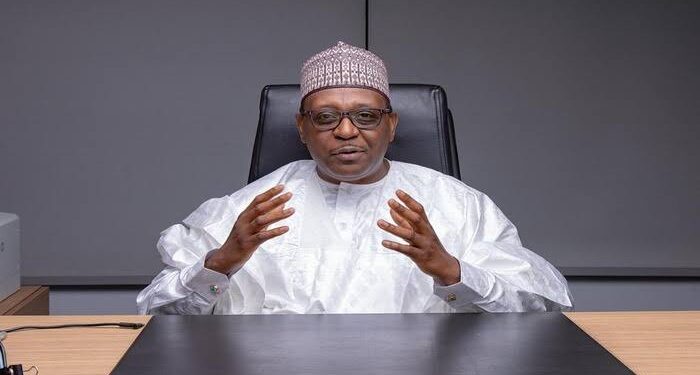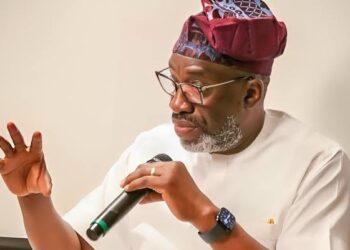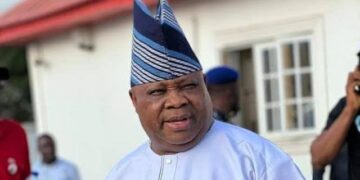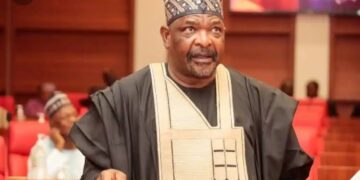President Bola Tinubu has approved the National Policy on Health Workforce Migration to address the ongoing exodus of Nigerian doctors abroad. The policy, announced by the Coordinating Minister of Health and Social Welfare, Professor Muhammad Pate, on his social media platform on Tuesday, aims to attract an estimated 12,400 Nigerian-trained doctors practicing overseas.
According to Pate, 67 percent of Nigerian-trained doctors are practicing in the United Kingdom alone. The minister stated, “The recruitment countries that recruit our professionals should have some responsibilities to help us expand the training, as the strain of health workers’ migration is continuous and will not stop tomorrow.”
Pate further commented, “The UK will need Nigerian doctors; 67 percent of our doctors go to the United Kingdom, and 25 percent of the NHIS workforce is Nigerian. Nigerians are very vibrant, entrepreneurial, and capable wherever they are. If Nigerians hold back from the UK, for instance, the NHS will struggle to provide the services that many Nigerians are going there to get.”

The Government of Nigeria, led by President Bola Ahmed Tinubu, GCFR, has approved a landmark policy aimed at transforming the management of human resources in the healthcare sector. This new National Policy on Health Workforce Migration addresses the critical challenges facing Nigeria’s health workforce.
As the African Union Champion for Human Resources for Health and Community Health Delivery Partnership, the President’s commitment to building a resilient and robust healthcare system is reflected in this forward-looking policy. It is more than just a response to the ongoing exodus of healthcare professionals; it is a comprehensive strategy to manage, harness, and reverse health worker migration.
The policy envisions a thriving workforce that is well-supported, adequately rewarded, and optimally utilized to meet the healthcare needs of all Nigerians. Many Nigerian healthcare workers have left the country in search of better opportunities, leaving their colleagues to contend with increased workloads and extended call hours.
The push factors behind this migration include inadequate equipment, worsening insecurity, poor working conditions, and an inadequate salary structure. The government has recognized the need to address these challenges and has developed this policy to address the critical issues facing the healthcare workforce. The healthcare workers have welcomed the policy, but they have also expressed the need for further details and a clear implementation plan.
The government has stated its commitment to addressing the concerns of healthcare workers and ensuring the successful implementation of this landmark policy. The organization establishes a structured framework for regular evaluations of working conditions. This framework ensures that health professionals, particularly those serving in rural and underserved areas, receive the appropriate recognition and remuneration that they rightfully deserve.
The policy aims to foster an environment conducive to professional growth and stability, with the objective of retaining top talent within Nigeria. In the context of an increasingly digital world, the integration of advanced health technologies is essential. The policy’s focus on digital health infrastructure, including electronic medical records, telehealth, and a comprehensive health workforce registry, represents a significant step towards a more efficient and data-driven health system.
These innovations will streamline healthcare delivery and enhance the equitable distribution of health workers, ensuring access to quality care for all Nigerians. Capacity building is a key element of this policy. It recognizes the importance of continuous professional development, with strategic partnerships and opportunities for international training to equip healthcare professionals with cutting-edge skills.

This investment in human capital underscores the government’s commitment to retaining and empowering the healthcare workforce. The policy also addresses the return and reintegration of Nigerian health professionals from the diaspora. By establishing streamlined registration processes and providing attractive incentives, the policy aims to not only encourage the return of talented professionals but also actively reintegrate them into the health system.
This approach leverages the expertise of the diaspora to bridge gaps within the health sector. The exchange of health workers benefits Nigeria. To strike a balance between safeguarding national interests and upholding the goals and aspirations of Nigerian healthcare professionals, the Government has negotiated bilateral and multilateral agreements that ensure healthcare workers migrating to other countries are replaced by newly trained workers in Nigeria.
This 1:1 match policy calls upon recipient countries to train a new healthcare worker in Nigeria for every publicly trained worker they receive. Acknowledging the need for healthcare professionals to maintain a healthy work-life balance, the Government’s policy incorporates various initiatives to enhance well-being and job satisfaction. These include periodic health screenings, mental health support, and reasonable working hours, particularly for junior doctors.
The governance of this policy will be overseen by the National Human Resources for Health Programme within the Federal Ministry of Health, in collaboration with state governments. This ensures responsible implementation and alignment with broader sector-wide health objectives. With this decisive action, the National Policy on Health Workforce Migration is set to secure the future of Nigeria’s healthcare system.
Under the leadership of the President, this policy will further catalyze the transformation of our health sector, ensuring access to quality healthcare for all Nigerians. As the Government embarks on this journey, all stakeholders are invited to contribute to building a healthcare system that reflects our nation’s potential and promise. The government has stated that they are currently engaged in negotiations with countries that Nigerian healthcare workers migrate to, with the goal of assisting Nigeria in enhancing its healthcare training facilities.



































